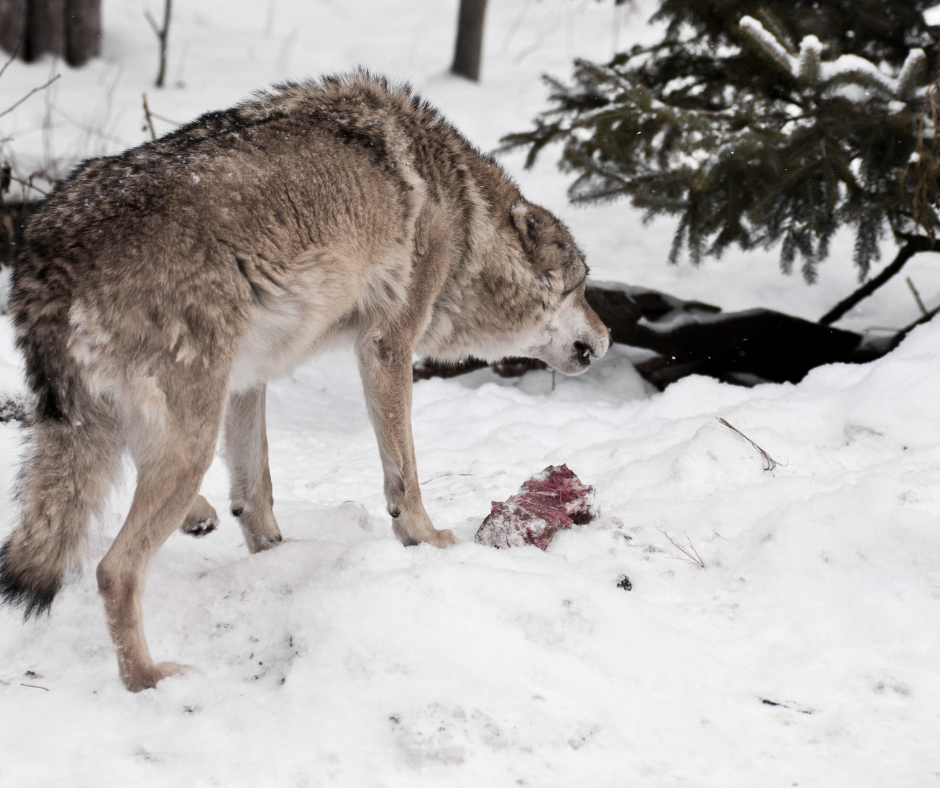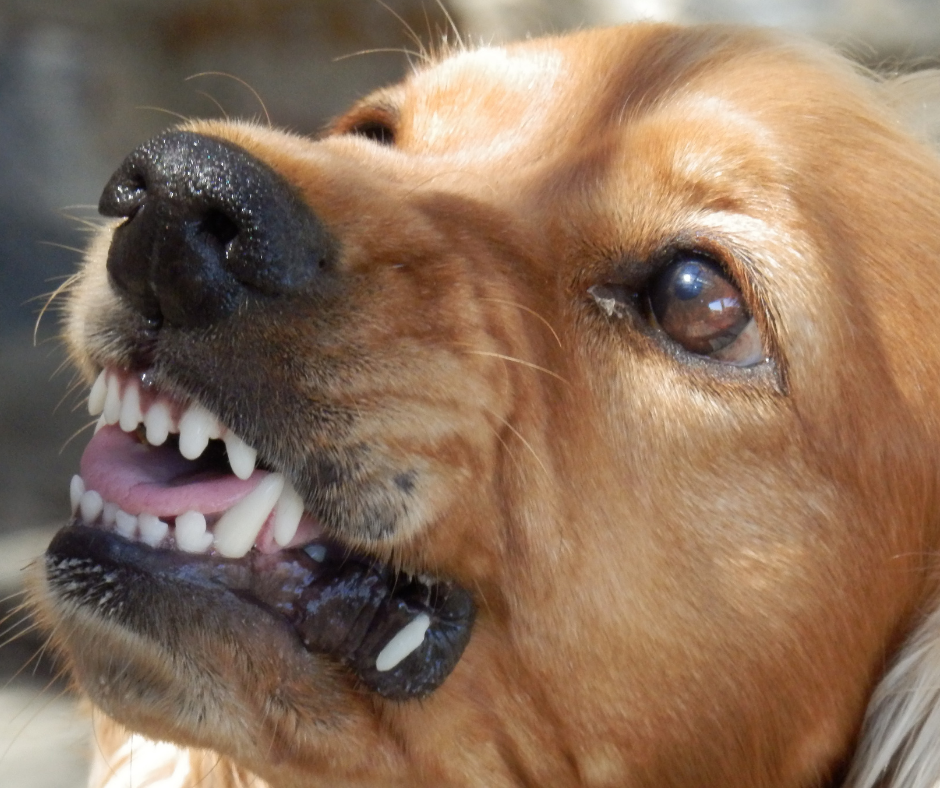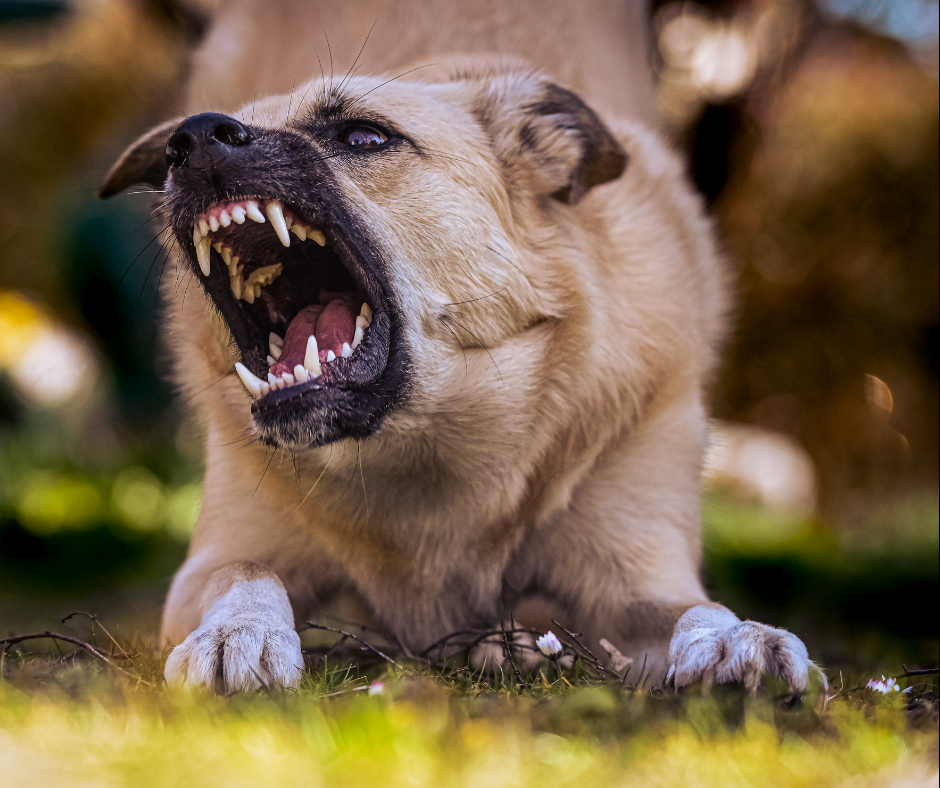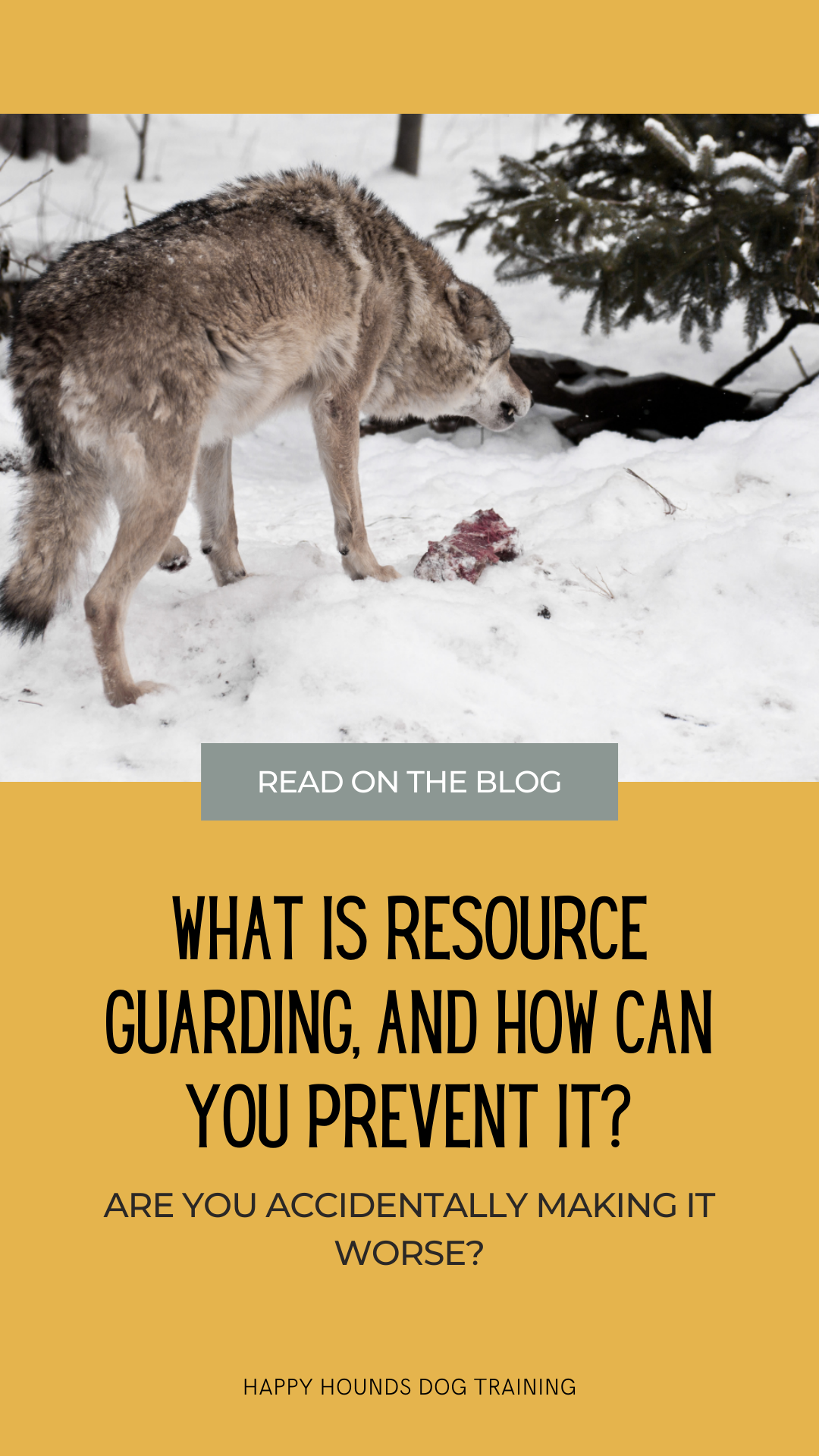You walk into the the living room and notice your dog Fluffy’s almost-finished bone. You bend down to pick it up so he doesn’t swallow the small pieces, and all of a sudden he hunches over it menacingly. Or perhaps you walk a little too close to Fifi while she’s curled up in her bed, and she growls at you. What is happening?! Why are Fluffy and Fifi suddenly acting like Cujo?!
This startling reaction is called “resource guarding”, and it’s one of the most misunderstood dog behaviors.
What is resource guarding? A simple definition is any aggressive behavior (hard eyes, hunching, growling, snarling, snapping, or even biting) when a dog is in possession of something. Commonly you will see resource guarding of food (food bowl, treats, or bones) but dogs can also guard their sleeping spot, owner, toys, or anything else that they decide is valuable. Your resource-guarding dog might behave aggressively towards you, other dogs, or even strangers who get too close.
Currently ~ 25% of my private consultations are for resource guarding. I mention that to make something clear:
Resource guarding is not abnormal behavior!

In a natural environment where dogs have to fend for themselves, resource guarding of food, mates, objects or space is a desirable trait. Think about it: if a dog willingly gave up everything valuable, they likely would not survive.
In domesticated environments (like your home!) however, we see all displays of aggression as undesirable. You may be thinking that your dog is being dominant or “bad” when they resource guard. This often leads to punishment based training. Punishment actually makes resource guarding worse (keep reading to find out why!), which increases the chances of serious harm.
Since resource guarding can be extremely dangerous, I always suggest working with a qualified positive-reinforcement dog trainer if you have concerns. If your dog has mild resource guarding, a fantastic reference book is “Mine!” by Jean Donaldson.

Whether your dog’s behaviour is mild or extreme, it’s important to understand why your dog is guarding and apply appropriate training methods to bring it to acceptable levels.
Resource guarding occurs on a progressive ladder. Dogs typically want to avoid conflict, but will resort to it if they feel it’s needed. Resource guarding dogs will often start with either hunching over the item, giving hard eyes, freezing, consuming the item faster, or moving the item away from you. Often these more subtle signs are ignored or unnoticed, so the dog escalates. Teeth shows, lip curls, snarling and growling often come next, with biting being the final level.
Why does your dog increase along the ladder of behaviour? Because that is what WORKS!
This is not your dog being “bad”; it’s actually normal behaviour.
All mammals resource guard to some extent, including humans.
That’s right- you’re a resource guarder! Humans notoriously try to “protect what’s theirs”. This may include keeping your valuables in a bank vault, keeping a weapon in your house in case someone breaks in, or even acting out if someone pays a little too much attention to your significant other.
You likely instinctively escalate your resource guarding behavior as you feel is necessary. Here’s an example!
Perhaps you forget to lock your car doors one night. Someone breaks into your car and steals your possessions.
What do you do?
Likely the first thing is you’d make sure you always have your doors locked! This is low level guarding of what’s inside your vehicle.
However, what would you do if someone then breaks into your locked vehicle and steals your possesions?
Perhaps get a car alarm? Maybe park it in a garage at night?
What if those protections don’t work, and someone again steals from you? What if they actually took your vehicle rather than just the possessions inside?
How far would you go to protect your car?
The point I’m trying to make is that you escalate your behavior in response to perceived threat. Therefore, does it still seem odd to you that your dog does the same with their valuables?
When you get robbed, you don’t just say “Oh well!!” and leave your car door wide open the next night for the thieves. No; you ADD a layer of protection to hopefully decrease the chances of it being taken again.
Hunching over their bone is the dog equivalent of locking your car door. Growling is the equivalent of adding a car alarm. Biting only occurs when those haven’t worked. It’s not that your dog wants to increase their behavior; they feel like they have to.

This is why punishing resource guarding (particularly the lower warning signs) will make the outcome even worse. You may notice a suppression in the behavior at first because the dog may stop displaying warning signs and then “all of a sudden” bite.
Let’s watch a very clear example of this. This video of Cesar Millan is exactly what NOT to do with a dog who resource guards:
Punishing a dog for growling is like taking the batteries out of a smoke detector during an active fire and thinking “fixed it!”. No. You only turned off the warning. The fire is still very much there.
If your dog is resource guarding, enlist a qualified dog trainer to help. It’s not an issue I suggest trying to fix on your own!
Don’t accidently promote resource guarding while trying to prevent it:
I see many well intentioned dog owners promote resource guarding when they’re actually trying to prevent it. In an effort to prevent resource guarding dog owners frequently put their hands in dogs food dishes while they eat, or randomly take away bones during chewing to show “that they belong to the owner”. Unfortunately, these “preventative” measures actual encourage resource guarding!
Watch this hilarious video about how we can create resource guarders:
So what CAN you do to prevent resource guarding?
At it’s simplest level, you need to ensure your dog has a positive emotion response to you approaching while it has a valued item. Instead of feeling like the item will need to be guarded, you want your dog to feel happy that you showed up because something even better might happen!
Let’s go back to the car theft example. What if instead of having your possessions stolen when you left your car unlocked you found a $100 bill on your front seat. Hmm… that’s odd! Might you be tempted to leave it unlocked again the next night to see what happens? Wow, you got another $100 bill! Yeah, leaving your doors unlocked might become a happy habit!
That’s a silly example, but you want to use the same psychology with your dog. You approaching needs to signal good things!
Proper ways to prevent resource guarding include:
- Let your dog/puppy enjoy their food in peace! How annoying would it be if somebody stuck their hand into your food at dinner? Would you perhaps move the plate away from them next time? One of the best things you can do is leave your dog alone while they eat so that they see no point in guarding from you.
- Positive-sum trades. If your puppy is eating a chewy, approach with something of higher value (such as cheese). The pup trades the chewy for the cheese, and then gets the chewy back! Cheese and a chewy?? Why wouldn’t they be happy the next time you approach while they’re chewing on something.
- Teach your dog both “Drop it” and “Leave it” using positive reinforcement.
- Occasionally approach while they’re eating from their food bowl and drop something of higher value into the dish as you walk past. If they’re having kibble, maybe you drop a liver treat into their dish. Say nothing and then walk away. Again, this will build a positive association with you approaching during meals because they’re used to you ADDING something rather taking something away. Do not do this with every meal! It’s still better to let dogs eat in peace the majority of the time.
Resource guarding is a natural behavior, but it can still become a problematic and scary one!
Prevention is always best. If your dog has already developed resource guarding tendencies make sure you work with a qualified, positive-reinforcement trainer to solve it!
Happy training 🙂
Disclosure: Happy Hounds uses affiliate links. Purchasing with these links will not cost you any extra, but I get commissions for purchases made through these links. Affiliate links help me to continue to offer free resources & blog posts. I would love if you used them!


Im very pleased to find this site. I need to to thank you for ones time for this particularly fantastic read!! I definitely really liked every part of it and I have you bookmarked to see new information on your site.